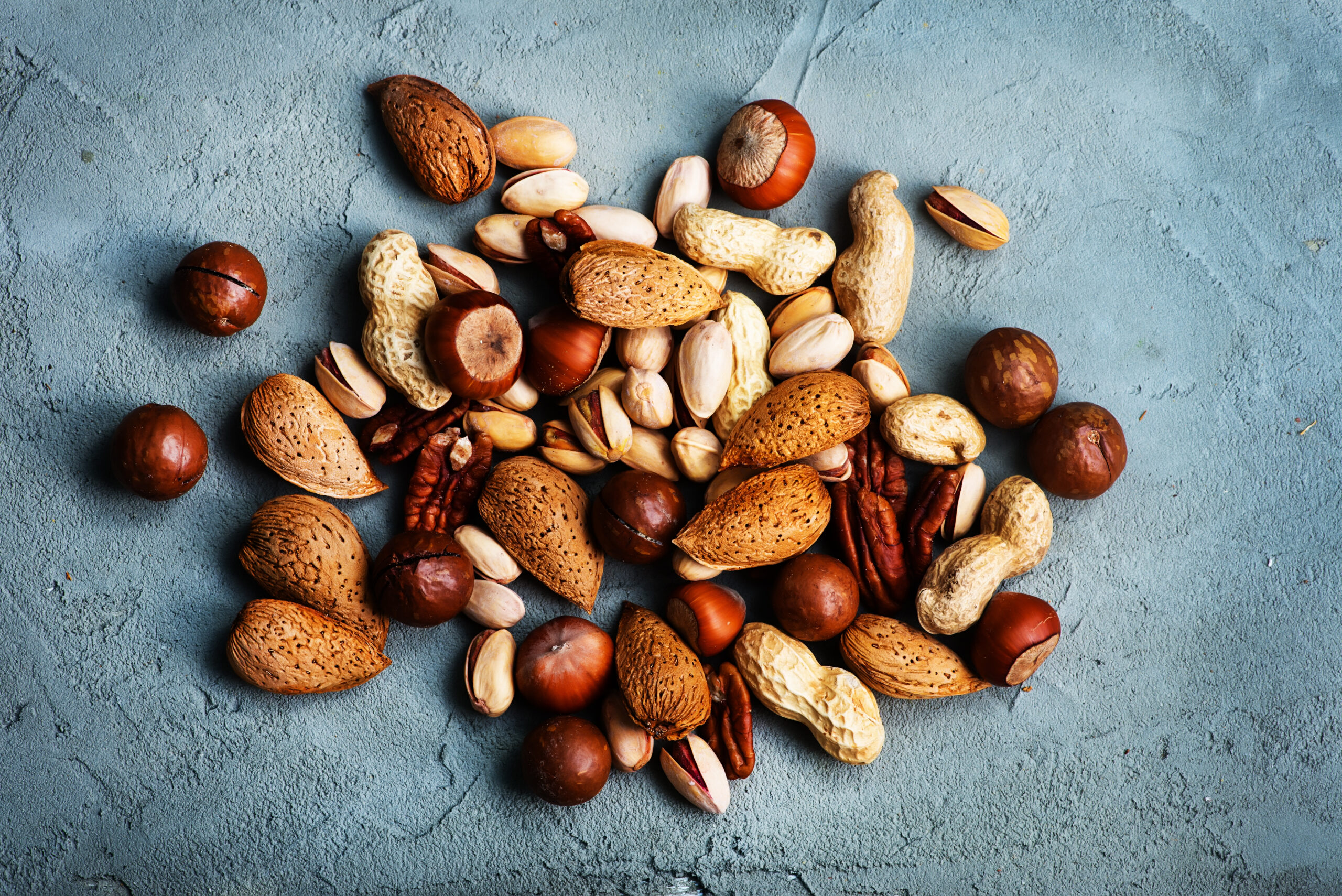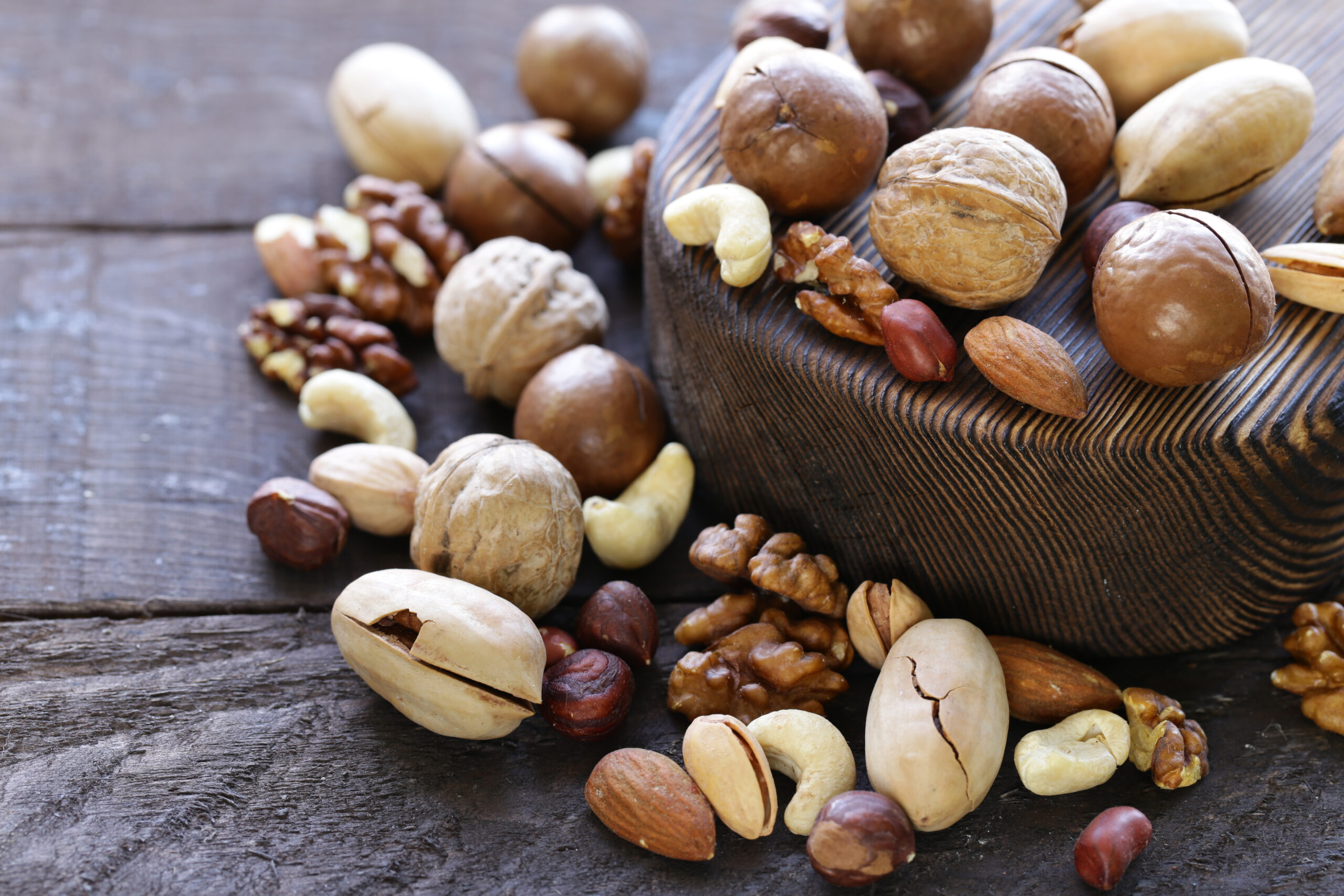The Ultimate Guide to Eating Hummus Like a Pro
If you think hummus is just a dip, you’re in for a delightful surprise. This creamy, flavourful delight is more versatile than most people realise,
When it comes to snacking, nuts make an excellent choice because of their numerous health and nutritional benefits. Available in different forms, whether it be toasted or roasted, salted or unsalted, regular or flavoured, there’s a wide selection of choices available.

A great source of vitamin E, almonds are one of the most popular types of nuts known for their flavour, high nutrient content, and versatility. They are mostly eaten raw or roasted and often made into almond butter, almond flour, or almond milk. Almonds may boost heart and gut health and help reduce the risk of cardiovascular disease by lowering LDL (bad) cholesterol.
Typically eaten raw or blanched, Brazil nuts have high levels of the mineral selenium, which has antioxidant properties and is needed for thyroid health and DNA synthesis. It is important to note that you should only eat 1-3 nuts per day because more than 400 micrograms of selenium can lead to selenium toxicity, which is linked to breathing problems, heart issues, and kidney failure.
A great source of copper, magnesium, and manganese, cashews are another type of nut that’s known for their nutrient profile and versatility. They are usually eaten raw and roasted and can be made into cashew butter or cashew milk. Cashews may promote brain health, immune system health, and bone health. They also may reduce blood pressure and lower LDL cholesterol levels.
Also a good source of nutrients such as vitamin E and manganese, hazelnuts are commonly found as ingredients in baked goods, chocolates, and ice cream. They are highly nutritious and help reduce inflammation, blood cholesterol levels, and heart disease risk levels.
Often found in baked goods, chocolates, and ice cream, macadamias are high in healthy fats and have lower carbohydrates than most nuts. They are a great source of manganese, and important nutrients like vitamin B1, which is important for nerve function. They may also help lower cholesterol levels and fight inflammation.
Usually found whole, chopped, or ground, pecans are popularly used in salads, baked goods, and ice cream. Pecans are a great source of fibre, copper, thiamine, and zinc, which play an important role in immune function and wound healing. Pecans may help promote heart health.
Commonly found in cakes and ice cream, pistachio is also one of the more popular nut types. They are a great source of anti-inflammatory and antioxidants, including vitamin B6, which is needed for nutrient metabolism and immune health.
Typically eaten as is, walnuts can also be added to salads, pastas, and baked goods. They are an excellent source of copper, which is a mineral that promotes immune function. Walnuts are significantly higher than other nuts in DHA and eating them may reduce the risks of heart disease, dementia, and type 2 diabetes.
According to Northwestern Medicine, almonds are known to help improve memory, pistachios help prevent inflammation, and macadamias contribute to normal brain function. However, walnuts are the best for brain health, as they offer two times as many antioxidants that counteract cognitive decline, and are packed with DHA, which is an omega-3 fatty acid that helps fight inflammation.
Harvard School of Public Health states that nuts are excellent sources of healthy fats, protein, and nutrients. The unsaturated fats help lower LDL (bad) cholesterol and raise HDL (good) cholesterol, which reduces heart disease risk factors.
Nuts are a rich source of protein, fibre, and unsaturated fats. This means that they keep you fuller for longer, which helps with weight management, as you will be satisfied enough to not overeat excess calories. However, keep I’m mind to consume in moderation, as eating too many nuts will also cause weight gain. Make sure to look up each type of nut’s nutritional profile and recommended daily serving.

Nuts give you energy and nutrients, making them a great snack and part of a healthy diet. They can be eaten roasted, salted or unsalted, and even flavoured like honey roasted or covered in chocolate. Nuts can also be used as a topper in salads, or are available in different forms such as nut butters and plant milks.
Among the nuts, pistachios have slightly fewer calories than the others and almonds and hazelnuts have less saturated fats than the others. Conversely, macadamias have the most calories and Brazil nuts have the most saturated fats. However you consume your nuts, it is important to eat in moderation and to eat the recommended daily amount to avoid weight gain or adverse health effects.
If you think hummus is just a dip, you’re in for a delightful surprise. This creamy, flavourful delight is more versatile than most people realise,
Fellow coffee lovers in Malaysia are embracing a convenient method to enjoy their favourite coffee shop quality drinks at home: coffee capsules. These pre-packed pods
Healthy snacking is crucial for a balanced diet, especially for weight management in Malaysia. While many Malaysians enjoy snacks, not all are healthy. Traditional options
Malaysia’s coffee culture is flourishing, with coffee enthusiasts seeking high-quality brews that rival café experiences. Among the rising trends, coffee capsules have emerged as a
Tel: +603-5569 2318
Fax: +603-5569 2208
Email: hello@sanglafoods.com
Lot 4, Jalan Peguam U1/25A, Hicom Glenmarie Industrial Park,
40150 Shah Alam, Selangor, Malaysia